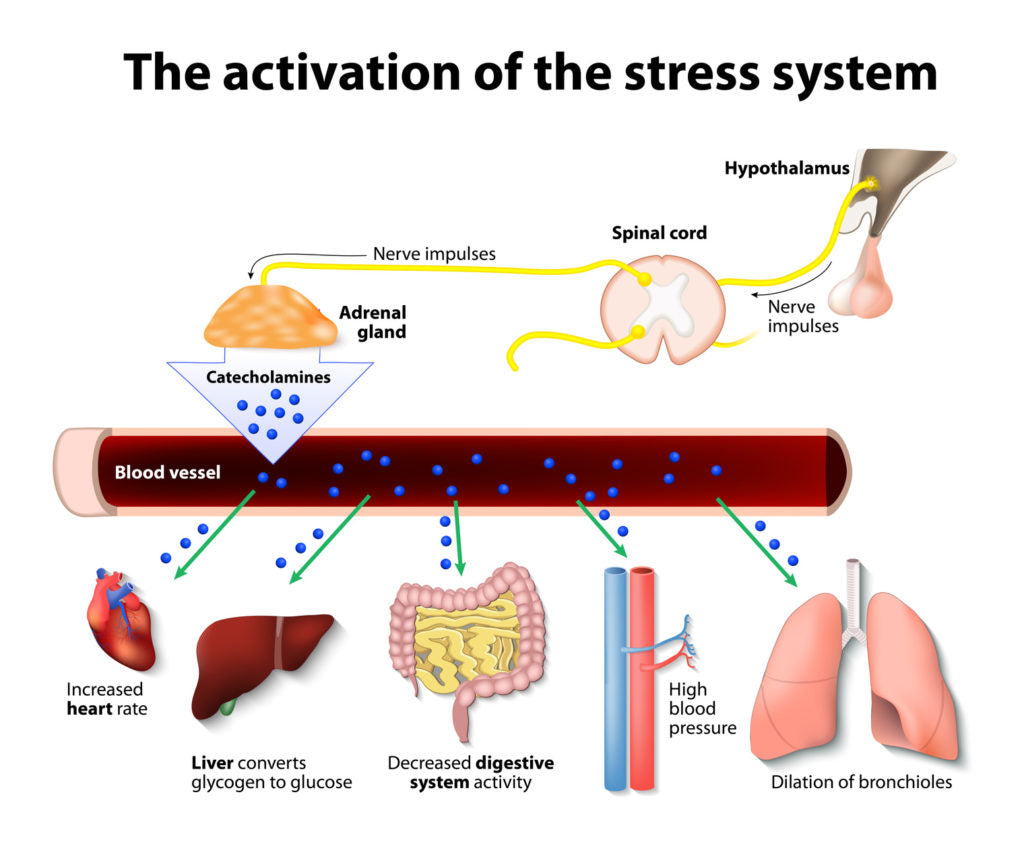Stress might just be the ultimate mind-killer.
Here's the ironic twist: Pills that many people pop for stress work by sedation...
...meaning that typical pills and supplements for stress are often effective at the expense of brainpower -- leaving people relaxed, but with a cognitive haze that makes it hard to think straight and get things done.
Nootropics for stress present different pathways to relaxation that may relieve tension while sharpening the mind.
This guide discusses some of the best stress-relieving brain-boosters, and how they may work for mental clarity.
Cognition Under Stress
Acute stress impairs short-term cognition
Anyone who has tried to think clearly in a high-pressure scenario knows the negative consequences of acute (short-term) stress on cognition.
Some researchers appear to validate these concerns by suggesting that various physical and emotional stressors -- in an acute context -- can knock neurotransmitters off-balance and have a negative impact on cognitive functions including:
- memory formation
- memory recall
- attention span and focus
- logical reasoning
- situational awareness
- decision making
- learning
Acute stress may be especially destructive to mental performance because it manifests when we need our brainpower the most, and may have far-reaching negative impact on many different cognitive functions.
 Stress activates a cascade of physiological reactions that prime body and mind for "fight or flight" -- which may have both beneficial and detrimental effects on cognitive function.
Stress activates a cascade of physiological reactions that prime body and mind for "fight or flight" -- which may have both beneficial and detrimental effects on cognitive function.Chronic stress may harm the brain
Stress is also insidious. It can build quietly over time, clouding the mind and diminishing all aspects of brainpower.
It may come as no surprise, then, that researchers have suggested that longer-range stress may cause damage to the brain's hippocampus -- including reduced hippocampal size and associated cognitive problems with learning and memory.
In addition, researchers have suggested that chronic stress may lead to chronic burnout syndrome -- a set of cognitive impairments including significant reductions in:
- nonverbal memory
- auditory attention
- visual attention
Some nootropics may be uniquely qualified to support the cognition you need in high-pressure situations by countering the mind-dulling effects of stress, while also supporting overall brain health to strengthen resistance to stress.
Mind Lab Pro® Nootropics for Stress
Rhodiola Rosea
Rhodiola rosea is a root herb that is classified as an adaptogen. In theory, adaptogen herbs help the body to “normalize” body functions that are off-kilter.<1>
More specifically, adaptogens help the body to adapt to any and all stressors, which are defined as any factors that force the body’s normal physiologic functioning to change:
- Physical stressors: Extreme cold, loud noise, exhaustion, toxins, excessive sun exposure
- Mental stressors: Mood imbalance, worrying, tension, fear, anxiety
Other stressors may even combine physical and mental factors, such as sleep deprivation.
 Chart from Panossian study illustrating the "balancing" effect of adaptogens on stress responses.
Chart from Panossian study illustrating the "balancing" effect of adaptogens on stress responses.When we think of nootropics for stress and otherwise, we usually think about mechanisms of action within the brain. Adaptogen herbs like Rhodiola rosea work on another pathway, as well: The Hypothalamic-Pituitary-Adrenal (HPA) axis.
Part of the endocrine system, the HPA axis is activated when we are exposed to anything stressful – triggering a cascade of hormonal reactions (including release of the stress hormone cortisol) that culminates in a fight or flight state, where the body is primed for vigilance and action in response to the perceived stressors.
Rhodiola rosea works, in part, by modulating stress induced HPA axis hormonal cascade; specifically, Rhodiola rosea blunts the release of cortisol and help to keep it in a normal range.
- Some research has shown that Rhodiola supplementation significantly reduced the amount of cortisol released into the bloodstream upon awakening.<2>
What does this mean for brainpower? Rhodiola rosea helps to keep stress responses in check – protecting body and mind from the exaggerated stress cascade that can lead to short-term brain fog and long-term mental exhaustion.
Some research has borne out this herb's anti-stress nootropic ability by suggesting that Rhodiola rosea may improve cognitive performance, especially concentration, while reducing cortisol release in subjects with low energy levels.
More on Mind Lab Pro® Rhodiola Rosea
Bacopa Monnieri
Bacopa Monnieri is a nootropic herb that is most well-known for its memory benefits, including benefits for learning and knowledge retention.
Like Rhodiola Rosea, Bacopa Monnieri is considered an adaptogen herb. It appears to help with stress by working on similar pathways as Rhodiola; notably, it appears to blunt brain chemicals that usually spike in response to stress.
- In addition to blunting the release of stress hormones, Bacopa Monnieri has been suggested to help regulate some "calming" brain chemicals, including serotonin and GABA, which may further help with stress relief and stress resistance.
Bacopa Monnieri is one of the most significant nootropics for stress.
In animal research, the herb has been compared against anti-anxiety pills. In this study, researchers appeared to make a significant discovery about Bacopa Monnieri's potential: Unlike the anxiety pills, which eased tension but were accompanied by mind-dulling amnesia and motor deficits -- Bacopa monnieri actually eased tension while promoting cognition.
More on Mind Lab Pro® Bacopa Monnieri
Phosphatidylserine (PS)
Phosphatidylserine is a phospholipid nootropic found in cell membranes throughout the body, including within brain cells. It is most highly regarded as a memory supplement, as well as for its natural support of long-range brain health.
- As an anti-stress nootropic, PS appears to share a key bioactivity that is typically associated with the aforementioned adaptogen herbs: PS is associated with a reduction in the release of cortisol.
Research has zeroed in on PS's cortisol-blunting anti-stress effects in the context of athletics, finding that supplementation of the phospholipid nootropic at a relatively high 800 mg dosage daily appeared to reduce cortisol responses during strength training.
This study seems to harmonize with additional research suggesting that PS may extend time to exertion in endurance training, as well as research suggesting PS may help golf players to improve their scores.
Backed by this early evidence, PS may represent a performance-enhancing anti-stress nootropic that helps with both the physical and mental stressors experienced during sports and high-intensity training.
More on Mind Lab Pro® Phosphatidylserine
N-Acetyl-L-Tyrosine
In addition to wreaking havoc on the HPA axis, stress is known to knock the brain chemicals norepinephrine and dopamine -- classified as catecholamines -- out of balance.<3>
When you have to do a lot of thinking under intense pressure, while multitasking, or in challenging environments, the brain burns through catecholamines faster to keep up with stress-driven demands -- potentially depleting these performance-critical brain chemicals to suboptimal levels.
According to the Catecholamine Hypothesis, lower levels of these catecholamine brain chemicals are directly associated with cognitive problems tied to mood balance and attention.
Stress-induced brain chemical depletions that diminish brainpower tend to create more stress, triggering a downward spiral of mental performance:
- You can’t perform as effectively, due to the stress-induced brain fog;
- You fall behind at work or school, which creates more pressure and stress;
- More pressure and stress worsens mental performance even more, creating more stress, which depletes catecholamines further.....
And so on and so forth.
L-Tyrosine, especially in the advanced N-Acetyl-L-Tyrosine (NALT) form, may be the ultimate nootropic for breaking the vicious cycle of stress-induced brain fog and attention problems.
L-Tyrosine is a natural precursor that the body uses to make the exact same catecholamine brain chemicals that are depleted by stress.
Supplementing with L-Tyrosine as a nootropic is suggested to help the body maintain its catecholamine stores, especially in response to intense stress and high-level thinking that may use up those stores more quickly. L-Tyrosine helps you keep up with the brain chemical-depleting effects of stress.
In addition, L-Tyrosine has been shown in some animal research to modulate stress hormones that can also put a drain on healthy catecholamine levels.<4>
L-Tyrosine is among the most effective evidence-backed nootropics for stress, especially extreme stress. In supplement form, L-Tyrosine has been shown to improve memory, information processing, mood and overall mental performance in subjects placed in highly stressful situations, such as:
- Cold exposure
- Low oxygen
- Sleep deprivation/fatigue
- Combat simulation
- Loud noise exposure
If it can help with those types of stressors, imagine how easily L-Tyrosine might handle the stress you experience when you run out of coffee.
L-Tyrosine has also shown benefit as a nootropic for multitasking, further strengthening its role as a nootropic for maintaining calm mental clarity under pressure.<5>
More on Mind Lab Pro® N-Acetyl L-Tyrosine
L-Theanine
Raises Alpha brainwaves to soothe away stress and promote calm mental clarity.
 An Alpha brainwave mind-state has been described as a feeling of "wakeful relaxation."
An Alpha brainwave mind-state has been described as a feeling of "wakeful relaxation."The "stress-creating-more-stress" vicious cycle not only diminishes brainpower, but also leads to mood imbalance and feeling blue – which makes it even harder to think straight.
Therefore, one of the most important steps you can take to reverse stress-induced brain fog is to simply relax – and L-Theanine is a unique nootropic that can help you do just that.
L-Theanine is a natural amino acid that is known for being one of the nootropics compounds in green tea. It has several beneficial bioactivities, but the most intriguing is L-Theanine’s ability to increase Alpha brain waves – thereby promoting a calm, clear, and creative mind state that is often described as “wakeful relaxation.”
- In short, L-Theanine’s Alpha brain wave-boosting activity has a direct and significant “chill out” effect that helps to soothe away stress.
L-Theanine also directly addresses stress with its calming effect on brain chemicals: Evidence suggests it may help to settle "agitating" neurotransmitters while promoting "relaxing" neurotransmitters.<6>
Human research has suggested that L-Theanine’s ability to calm excitable neurons is reflected by a slower heart rate and lower stress chemical markers in human subjects subjected to high-pressure mental performance tasks.<7>
This nootropic offers even more benefits for stressed-out brains:
L-Theanine eases the nervousness and jittery side effects of excessive caffeine consumption
If you fall behind at work you might start chugging mug after mug of coffee to boost alertness and catch up. The downside: All that extra caffeine places more stress on body and mind, and may lead to the dreaded caffeine jitters that make it impossible to perform optimally.
- L-Theanine has been shown to help reduce jittery side effects sometimes associated with caffeine consumption
For this reason, L-theanine plus caffeine is one of the most widely used nootropic stacks.
L-theanine and caffeine's natural synergy also explains why drinking green tea is so popular: It promotes mental alertness that is cleaner and clearer than what you might experience with drinking highly caffeinated coffee.
 Green tea naturally supplies the prized "Theanine + Caffeine" nootropic stack.
Green tea naturally supplies the prized "Theanine + Caffeine" nootropic stack.L-Theanine indirectly helps other nootropics for stress by supporting restful sleep
Ever go to bed stressed and wake up groggy and brain-foggy?
Stress can disrupt healthy sleep patterns because it activates your body’s sympathetic nervous system to release fight-or-flight stress hormones that are designed to keep you alert and awake – even when it’s bedtime.
The poor-quality sleep that follows may create more stress, more brain fog, more sleep issues and even health concerns. Stress-induced vicious sleep cycles are hard to break, and require a special kind of sleep aid.
- Clinical study has shown that L-Theanine is a safe, natural and effective sleep remedy that may significantly improve sleep quality.
Researchers are now learning that L-Theanine, unlike tranquilizing sleep aids, works to encourage sleep onset via relaxation without sedation. This suggests that L-Theanine may help you wake up without the groggy aftereffects of harsher sleep remedies.
Healthy, rejuvenating sleep can go a long way in reducing overall stress levels – adding yet another layer of nutritional support to L-Theanine’s nootropic activity.
More on Mind Lab Pro® L-Theanine
Conclusion
Mind Lab Pro® nootropics for stress help you maintain mental sharpness by promoting relaxation and stress resistance without sedation
Mind Lab Pro®‘s unique Universal Nootropic™ design helps to optimize the whole brain.
This advanced formula includes targeted nootropics for stress that help to both optimize peak mental performance under pressure while protecting the brain against the negative effects of chronic stress to promote long-range mental clarity.
References
- Panossian A, Wikman G. Effects of Adaptogens on the Central Nervous System and the Molecular Mechanisms Associated with Their Stress—Protective Activity. Pharmaceuticals (Basel). 2010 Jan; 3(1): 188–224.
- Olsson EM, von Scheele B, et al. A randomised, double-blind, placebo-controlled, parallel-group study of the standardised extract shr-5 of the roots of Rhodiola rosea in the treatment of subjects with stress-related fatigue. Planta Med. 2009 Feb;75(2):105-12.
- Ranabir S, Reetu K. Stress and hormones. Indian J Endocrinol Metab. 2011 Jan-Mar; 15(1): 18–22
- Reinstein DK, Lehnert H, Wurtman RJ. Dietary tyrosine suppresses the rise in plasma corticosterone following acute stress in rats. Life Sci. 1985 Dec 9;37(23):2157-63
- Thomas JR, et al. Tyrosine improves working memory in a multitasking environment.. Pharmacol Biochem Behav. 1999 Nov;64(3):495-500.
- Nathan PJ, Lu K, Gray M, Oliver C. The neuropharmacology of L-theanine(N-ethyl-L-glutamine): a possible neuroprotective and cognitive enhancing agent. J Herb Pharmacother. 2006;6:21–30.
- Kimura K. L-Theanine reduces psychological and physiological stress responses. Biol Psychol. 2007 Jan;74(1):39-45




